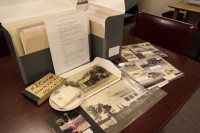Pistols and Petticoats

In 1735, Captain Joseph Bowman of Lexington, Massachusetts, was assessed taxes on the following: two orchards, one slave, four oxen, eight cows, two horses, ten sheep, and one pig.
That’s according to the meticulously hand-written pages made by Captain Bowman’s contemporaries 276 years ago. Made delicate by time, these documents rest within archival boxes, cataloged, shelved, and preserved in a climate-controlled vault at Cary Hall. There, they await “eternal life” in the form of digital scanning, along with tens of thousands of other pages that document Lexington’s history.
Down the road, at the freshly renovated Munroe Tavern, is a blue-striped, British army-issue wool blanket left behind by retreating redcoats fleeing the April battles of 1775. The Lexington Historical Society claims that it is one of only a handful of such blankets extant in the U.S. None have been found in England. This rare object is now carefully cataloged, researchable, and available for viewing in a glass exhibit case at the Tavern.
Over at Cary Memorial Library, four rooms are dedicated to local history resources: genealogy records, books from the colonial and revolutionary war period, collections containing the history of other towns and states, and the celebrated Worthen Collection (mid-19th to mid-20th centuries), now fully cataloged and cross-indexed, with portions of it digitally available at the Library’s website. The treasures of Lexington’s history – needlework samplers, petticoats, pistols, and goblets; 18th century letters, deeds, and sermons; ledgers of female voters and of soldiers who fought in the Civil War; historic maps, etchings, ticket stubs, photographs, books, and more – are held primarily by three public-spirited groups: the Town of Lexington, the Lexington Historical Society, and Cary Memorial Library. In recent years, these institutions have stepped up their archiving and curating activities, thanks to grants from the Community Preservation Act, the Massachusetts Board of Library Commissioners, and elsewhere. Today, more than ever before, anyone who’s interested can discover and see these items by looking online, making a phone call, or paying a visit to Lexington. Digitizing, both ongoing and planned, will make these collections even more accessible.
Case in point: The Edwin B. Worthen Virtual Exhibit. After five years of planning, work, and a $20,000 grant from the Massachusetts Board of Library Commissioners, the virtual exhibit finally went live on the Library’s website in early September. Almost immediately, the Library began receiving inquiries. “The reference desk got a call from a guy in Texas who had found the virtual exhibit online and looked through it and said, ‘I’m going to be traveling next month to visit my parents. I’d like to stop in,’ ” says Linda Carroll, the Library’s local history librarian. Now that the Worthen Collection is digitally searchable, it can be used for tracing genealogies exploring the development of neighborhoods or for anything else researchers dream up. “I hope it will be used to its fullest potential,” says Carroll.
Preservation efforts at Town Hall are aimed at saving and restoring materials that date as far back as the 1600s and opening them up to the world on the Internet. “It is our heritage. We have to preserve it,” says Nasrin Rohani, the Town’s part-time archivist. The work is largely funded by CPA funds, about $600,000 over the past four years. The more that gets preserved, indexed, and digitized, the richer the record becomes. “As we continue with this project, the information we gather and preserve becomes more and more meaningful,” says Town Clerk Donna Hooper.
For countless hours over the past several years, Elaine Doran, the Archivist and Collections Manager at the Lexington Historical Society, has been moving item by item through the Society’s collections of 12,000 documents, books, papers, and objects stored at the Hancock-Clarke House. She has been cataloging them into searchable databases, triaging their conservation and preservation, and fielding inquiries from researchers. Some of the collections will be available through the Internet, but, unlike the Library and the Town Hall, the Historical Society is a private organization, with significant portions of its collections restricted by copyright or the wishes of donors. However, even though much of the developing databases will be offline, they will still be a boon to researchers who can take advantage of them by calling or visiting the Society. The Society is currently seeking funding for the conservation and digitization of about 600 documents. “We own these things, but they are our town’s history,” says Doran. “If we don’t preserve them, everyone loses.” Among the researchers who will be poking through these collections for the first time in their newly preserved formats are the students of Lexington High School teacher Matt Gardner. In his course, “Honors Field Research,” students write research papers on local history using the resources at Town Hall, Cary Memorial Library, the Lexington Historical Society, and special private collections around town. The course is the brainchild of LHS teacher Richard Kollen, who developed it and taught it for many years before he retired. Gardner resurrected the course last year. Students write on such topics as the Follen Church Society, the history of Five Fields, and the rivalry between the East and Center Villages. Their completed papers are available for reading at the Library. “Community support for this class is so high,” says Gardner. “We are fortunate that these resources are so close to the High School.”
So close to the High School, and so close to us all.
Jeri Zeder lives in Lexington’s historic East Village.
